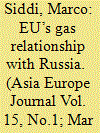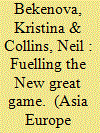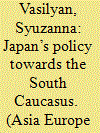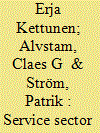|
|
|
Sort Order |
|
|
|
Items / Page
|
|
|
|
|
|
|
| Srl | Item |
| 1 |
ID:
152936


|
|
|
|
|
| Summary/Abstract |
Although it seemed that the year 2012 was to be a pivotal moment for the EU in terms of positioning itself as a global supporter and defender of human rights, the Union continues to find it challenging to foster substantial ideational human rights change in ASEAN, despite cooperation growing on a practical level. Drawing on diffusion theory and with a focus on EU-ASEAN relations, this article examines the EU’s capacity to promote human rights to ASEAN and argues that whilst there is awareness within the EU of the shortcomings and challenges of EU external action concerning human rights support, how the EU diffuses human rights norms remains a challenge for the Union. This is primarily due to the fact that EU norm exportation takes place in the context of omnidirectional ideational flows which do not always facilitate the EU’s agenda or provide the intended outcomes of EU policy.
|
|
|
|
|
|
|
|
|
|
|
|
|
|
|
|
| 2 |
ID:
152939


|
|
|
|
|
| Summary/Abstract |
This article analyses the current state of the gas relationship between the European Union (EU) and Russia and assesses its future prospects. It highlights that Russia has been an important supplier of gas to the European Union for more than four decades. However, the EU-Russia gas trade currently faces uncertainty over the regular transit of Russian gas via Ukraine, the construction of new pipelines and the implementation of EU legislation concerning the Union’s gas market. As the EU and Russia will remain interdependent in the gas sector at least for the next decade, it is in both sides’ interest to resolve these issues. The EU should both strengthen the security of its import routes for Russian gas and reduce the vulnerability of individual member states to supply shocks. Simultaneously, the EU would do well to increase the production of renewable energy and boost energy efficiency, which would reduce its dependence on external suppliers of fossil fuels.
|
|
|
|
|
|
|
|
|
|
|
|
|
|
|
|
| 3 |
ID:
152934


|
|
|
|
|
| Summary/Abstract |
This article looks at the “New Great Game” as the most widely used metaphor for the geopolitical dynamics of Central Asia. Its focus is on Kazakhstan and Europe with particular reference to energy policies. The European approach to Kazakhstan is conditioned by its energy security priorities with issues of democracy and human rights relegated to the margins. For Kazakhstan, the article suggests that the game is played with an eye to regime legitimacy, territorial integrity, and international recognition. Relations between Kazakhstan, China and Russia are also examined. Some of the limitations and strengths of the Great Game metaphor are analysed.
|
|
|
|
|
|
|
|
|
|
|
|
|
|
|
|
| 4 |
ID:
152937


|
|
|
|
|
| Summary/Abstract |
The article investigates Japan’s foreign policy towards the South Caucasus by unveiling the full range of its paraphernalia. After dwelling on Japan as a foreign policy actor, it delineates the policy vis-à-vis the South Caucasian states of Armenia, Azerbaijan and Georgia along the categories of political dialogue, development assistance and economic cooperation by relying on untapped primary sources. Subsequently, the article analyzes the official discourse pertaining to Japan’s strategy and tactics with respect to the South Caucasus. Ultimately, it provides an explanation by situating the case study within the existing conceptual frameworks of “civilian” and “normative power”. Based on the findings, the article argues that Japan has not been a “normative” but it has been a “civilian power”—a conceptual framework, which can be placed within the theory of neo-liberalism. In a nutshell, even though Japan is an enigmatic actor, it has been predominantly pragmatic in its policy towards the South Caucasus.
|
|
|
|
|
|
|
|
|
|
|
|
|
|
|
|
| 5 |
ID:
152938


|
|
|
|
|
| Summary/Abstract |
The aim of this paper is to investigate how new rules and practices in multilateral, regional and bilateral trade negotiations related to the services industries can be adopted and implemented at the business level, using the recently concluded free-trade agreement (FTA) negotiations between the EU and Singapore as an illustrative case. The purpose is to put the services sector into the larger framework of business service interaction between the EU and the outside world by identifying crucial sub-sectors within the services industries and their relations to physical, ‘visible’ production and trade. Furthermore, to assess the prospects of ‘multilateralising’ regional trade agreements within the service sector, through the ambitions by both parties to make bilateral and interregional FTAs and EPAs more compatible and mutually comparable with the multilateral GATS’ rules. The EU-Singapore FTA is an agreement that became a ‘second-best’ solution of the stalled interregional EU-ASEAN negotiation, taking place 2006–2009. It can nevertheless be seen as a ‘WTO-plus’ endeavour, since it aims at reaching beyond what is under negotiation in the likewise stalled Doha Development Agenda within the WTO framework, particularly in the fields of business services, public procurement, intellectual property rights, trade-related investment measures, and, generally, competition rules. Since both parties already apply low or zero tariffs in most sectors of manufacturing, the main issues in the negotiations were related to services in general and knowledge-intensive business services in particular, with an emphasis on technical barriers to trade.
|
|
|
|
|
|
|
|
|
|
|
|
|
|
|
|
| 6 |
ID:
152935


|
|
|
|
|
| Summary/Abstract |
The paper argues that Russia’s foreign policy vis-à-vis Ukraine and Turkey severely compromises its gas diplomacy. In utilizing the concept of issue salience, it attempts to show how, by means of prioritizing geopolitical benefits in both cases, Russia has failed to serve its energy security goals in two distinct ways. Firstly, it has not managed to resolve transit-related impediments to its export strategy, by both failing to break transit dependence on Ukraine and damaging relations with prospective transit state Turkey. Secondly, it has jeopardized its customer base in two significant markets. This brings severe repercussions not only for its energy industry but also for its grand strategy. The paper thus proceeds to suggest ways in which Russia’s energy and geopolitical interests can come to be served together, rather than undermine each other, as is currently the case. This is essential if Russia is to retain its political clout and international standing, given its strong dependence on energy-born revenues.
|
|
|
|
|
|
|
|
|
|
|
|
|
|
|
|
|
|
|
|
|